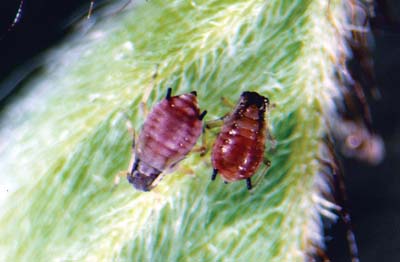To save the Web-optimized images shown below to your hard drive:
|
Click to access Display and Print quality images. |
Vegetable crops that are commonly attacked include asparagus, carrot, cowpea, kidney bean, lettuce, and lima bean. Weeds that serve as alternate hosts include dandelion, lambsquarters, pigweed, shepherd's purse, dock, goldenrod, and pepperweed. The cowpea aphid colonizes various plant tissues including stems, pods, and leaves, but the stems are preferred. The aphid removes plant sap, resulting in an abnormal growth pattern. The aphid does not produce toxins, and normal plant growth will resume once the aphids are removed. The principal damage caused by this species of aphid is disease transmission. The cowpea aphid is capable of transmitting over 30 plant viruses. Cowpea aphid populations can be monitored using sampling techniques such as sweep nets and visual inspections. Insecticides are commonly used to protect crops and both systemic and contact insecticides are available. In some cases, host plant resistance may also be used to prevent damage by the cowpea aphid.
Images
To save the Web-optimized images shown below to your hard drive:

Cowpea aphid, Aphis craccivora, nymphs on hairy indigo.
(Photographer: P. Choate, University of Florida)
Click to access Display and Print quality images.
|
|
Click to access Display and Print quality images. |
|
Click to access Display and Print quality images. |
|
Click to access Display and Print quality images. |